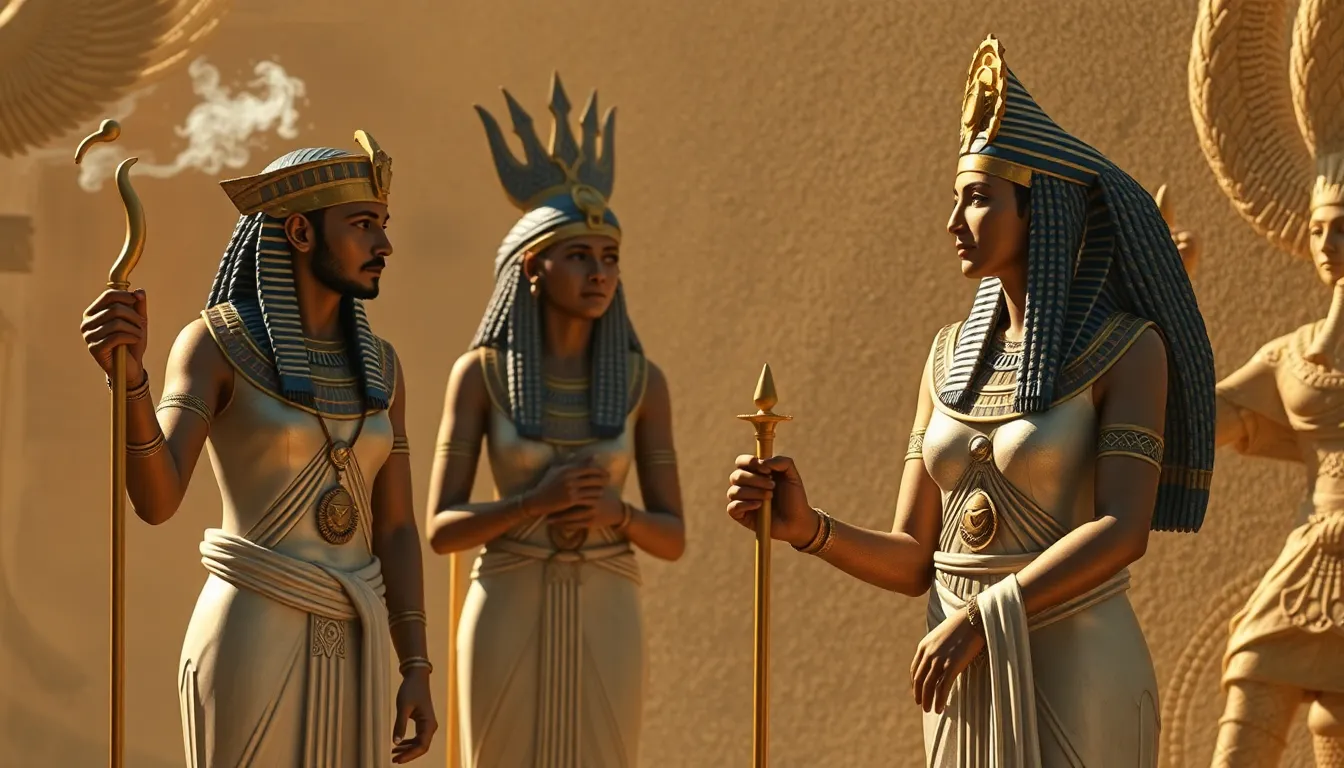The Divine Healers: Gods and Goddesses of Medicine in Ancient Egypt
I. Introduction
Ancient Egyptian civilization, renowned for its rich culture and profound spirituality, held a unique perspective on medicine and healing. The Egyptians viewed health not merely as a physical state but as a harmonious balance between the body, mind, and spirit, deeply intertwined with their religious beliefs.
The importance of divine figures in medical practices cannot be overstated. Gods and goddesses were invoked in healing rituals, with each deity representing specific aspects of health and wellness. This article explores the primary gods and goddesses associated with healing in Ancient Egypt, highlighting their roles, attributes, and influence on medical practices.
II. The Role of Religion in Ancient Egyptian Medicine
Religion was central to every aspect of life in Ancient Egypt, including health. The Ancient Egyptians believed that illness was often a punishment from the gods or a result of demonic influences, making the spiritual realm integral to their understanding of medicine.
- Interconnection between spirituality and health: Healing was seen as a divine process, where the intervention of gods was essential in restoring health.
- Rituals and practices in healing processes: Priests often performed rituals, prayers, and offerings to appease the gods and seek their favor in healing the sick.
- The influence of mythology on medical understanding: Myths provided explanations for diseases and their cures, shaping the medical knowledge of the time.
III. Imhotep: The God of Medicine and Healing
Imhotep is perhaps the most significant figure in Ancient Egyptian medicine. Originally a historical figure, he was a vizier and architect during the Third Dynasty, credited with designing the Step Pyramid of Djoser. Over time, he was deified and became associated with healing.
- Historical background of Imhotep: His contributions to architecture and medicine earned him a revered status, making him a symbol of wisdom and healing.
- His contributions to medicine and architecture: Imhotep is often considered the first physician in history, with texts attributed to him outlining surgical techniques and medicinal practices.
- Worship and legacy as a divine figure in healing: Imhotep was worshipped in various temples, and his legacy influenced both ancient and modern medical practices.
IV. Hathor: The Goddess of Joy, Love, and Healing
Hathor, one of the most beloved goddesses in Ancient Egypt, was associated with joy, love, and motherhood, but she also played a vital role in healing.
- Overview of Hathor’s attributes and symbols: Often depicted as a cow or a woman with cow horns, Hathor embodied fertility and nurturing.
- Her role in childbirth and maternal care: Hathor was invoked during childbirth, providing protection and health to mothers and infants.
- Rituals and offerings dedicated to Hathor for health: Devotees would offer music, dance, and food to seek her blessings for health and well-being.
V. Sekhmet: The Warrior Goddess of Healing
Sekhmet is a complex goddess known for her dual nature as both a destroyer and a healer. Her fierce demeanor and protective qualities made her a formidable figure in the realm of health.
- Dual nature of Sekhmet as both destroyer and healer: While feared for her capacity to bring plague and destruction, she was also revered for her healing abilities.
- Mythology surrounding her healing powers: Legends depict Sekhmet as using her fiery breath to heal, emphasizing her role as a goddess of both war and medicine.
- Practices invoking Sekhmet for protection and cure: Rituals often involved offerings of incense and prayers for her to heal the sick and protect them from disease.
VI. Thoth: The God of Wisdom and Medicine
Thoth, the god of wisdom, writing, and knowledge, also played a significant role in the medical practices of Ancient Egypt.
- Thoth’s association with knowledge and healing arts: He was believed to possess immense knowledge about the human body and the healing arts.
- Role in medical texts and prescriptions: Thoth was often credited with the authorship of important medical texts that guided physicians in their practices.
- Influence on the development of medical practices in Ancient Egypt: His teachings contributed to the systematic approach to medicine, blending spiritual and empirical practices.
VII. Anubis: Guardian of the Afterlife and Health
Anubis, known primarily as the god of mummification and the afterlife, also had significant connections to health and medicine.
- Anubis’s connection to medicine through mummification: His role in preserving the body for the afterlife underscored the importance of physical health even after death.
- His role in protecting the physical body and spirit: Anubis was believed to safeguard individuals during their journey in the afterlife, promoting the idea of spiritual health.
- Healing practices related to funerary rites and the afterlife: Rituals involving Anubis often included prayers for health and well-being, reflecting the belief in the interconnectedness of life and death.
VIII. Conclusion
The divine healers of Ancient Egypt played a crucial role in shaping the medical practices and beliefs of their time. Each deity contributed uniquely to the understanding of health, emphasizing the interplay between spirituality and physical well-being.
These gods and goddesses not only influenced the medical practices of their era but also left a lasting impact on modern medicine. The reverence for divine figures in healing reflects a timeless human desire to understand and combat illness through faith and spirituality.
In reflecting on the interplay between faith and healing in ancient societies, we find that the lessons from Ancient Egypt continue to resonate, reminding us of the profound connection between our beliefs, our bodies, and our health.




